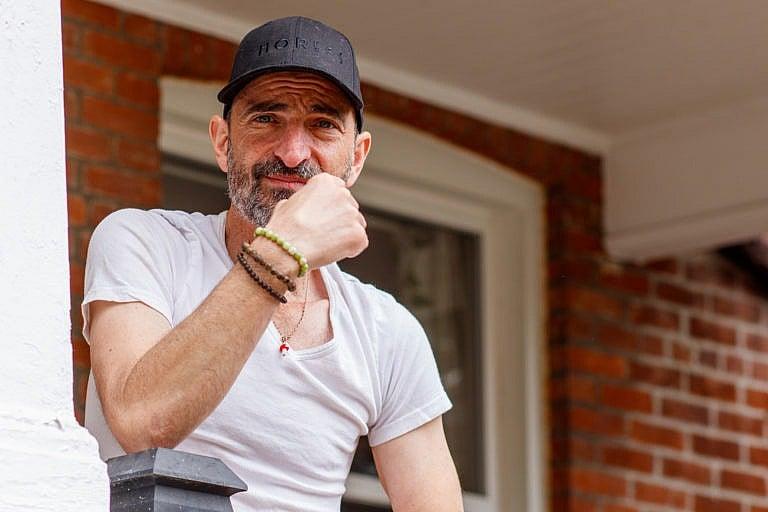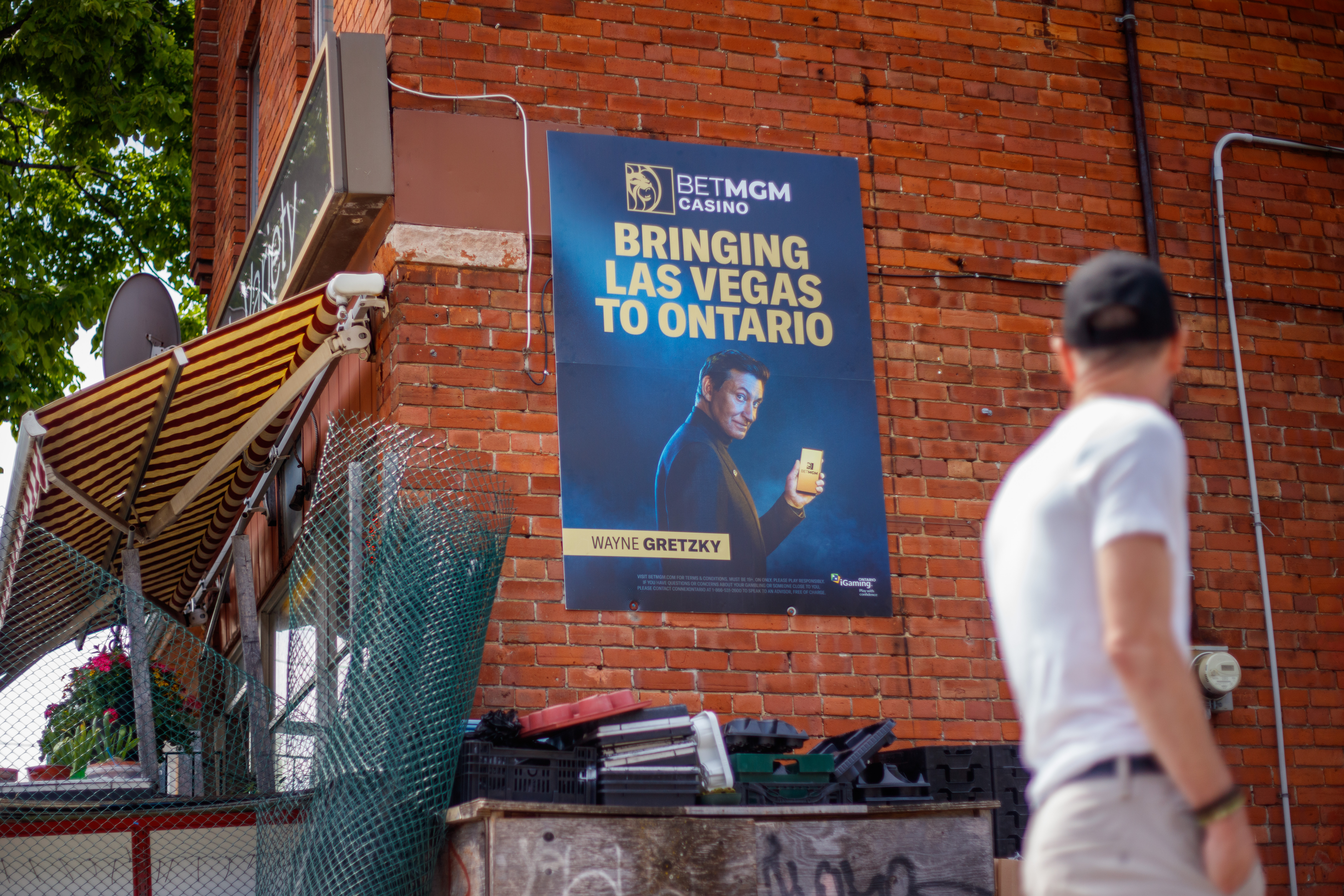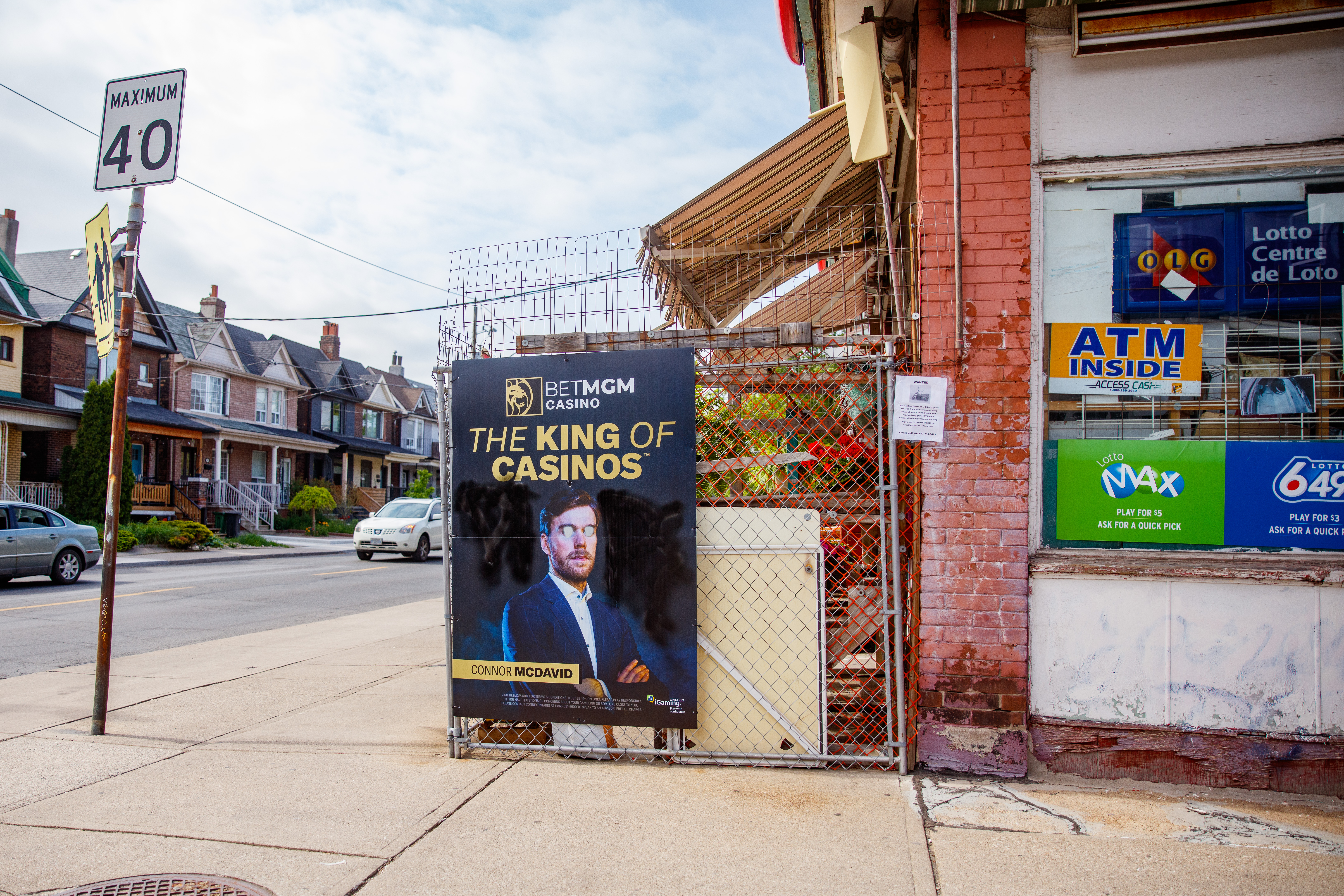Ontario’s online betting boom makes it hard to be a recovered gambling addict
When Ontario legalized online single-game sports betting—followed by the flood of ads promoting gambling—it put the recovery of countless recovered addicts like me to the test

For recovering gambling addicts like Adam Pettle, the recent throng of online sports betting websites legalized in Ontario are beyond triggering (Photos by Claudine Baltazar)
Share
When single-sport online gambling became legal in Ontario last month, I received text messages from many friends asking how I felt about the barrage of online casino ads popping up all over town like whack-a-moles.
I would text back a quip about how much I was learning. For example, I learned the precise spot to cross Campbell Avenue so that I don’t have to come face-to-face with the large banner ad for the MGM Casino promising to bring Las Vegas to Toronto, which hangs on the side of the bodega at the end of our street.
I’ve also learned to mute the TV while backing out of the room as soon as the third out is recorded during Blue Jays telecasts to ensure that I don’t catch the first commercial (there’s an even-money proposition that it will be for a betting website).
When you’re in recovery for a gambling addiction in this new era of mainstream sports betting, lessons like this can save your life—or at least go a long way in combating all those other things you learned all those years ago: don’t be a wuss. Run from negative emotions. Numb discomfort at all cost. Put the house in your wife’s name. Look for horses claimed last time out.
All of the latter, I learned from my father. He learned them from his father, who got them from his, my great-zayda Jack, a four-foot-nothing pugilist with a face like an old boot, who famously once put a Warsaw anti-Semite in a garbage can. He also infamously lost his only pair of shoes to a straight flush in a floating shtetl poker game.
You could say I come by my gambling addiction honestly. Which is ironic because gamblers don’t come by anything honestly.
When I was six years old and my brother was eight, my father, an obstetrician in Toronto, taught us what Leonard Cohen calls “the holy game of poker” in a makeshift poker pit in the basement of my family home where he’d set up a puke-green collapsible bridge table. On top of it sat a fresh pack of blue Bicycle playing cards, purchased on his way home from delivering a baby. The chips were salvaged from a banged-up box of tiddlywinks and stacked evenly in front of each of our spots.
“The game is five-card draw,” he explained. “Straight seven and its high-low variation. A flush beats a straight. Unless you’re playing three-card poker. Remember: never fold unless you’re facing a bet.” Check. We covered five-card stud and the Bathurst Manor wrinkle (four flush beats a pair), and learned about the astronomical odds of that final showdown hand in The Cincinnati Kid.
Just like that, I was under a spell that only intensified when my father got up from his seat at the table and left our family for good. He actually took the bridge table with him.

Gamblers are like geometrists in velour tracksuits: always looking for an angle. One of the angles I always played was that I was just a guy who loved watching sports. What I really loved was betting on them.
Secretly, I prided myself on being able to wager on any event—even darts. In fact, on one particularly grim and grey November trip to Sault Sainte Marie in 2005 to visit my in-laws, I watched the entire World Darts Championship with my late father in-law, John—the only person I ever met who rivalled my sport-watching prowess. Unbeknownst to John (or his daughter), I was pulling hard for Martin Adams to stick a 180. I didn’t know who the fuck Martin Adams was. But that didn’t stop me from laying a sizable bet on him.
If the game was on, it was a solid bet that I had action on it. That’s just how it went until December 2020, when the addiction that had been steadily beating up on me since my bar mitzvah 35 years earlier finally knocked me down to one knee, which, it turned out, was the perfect position from which to nail the for sale sign on the front lawn of our family home. After I sold the house to pay my debts, with the support of the people still miraculously in my corner—my wife, my two kids, my big brother (who recently turned down an audition for a role in a potentially-lucrative voice job for an online casino), a recovery community and an amazing therapist—I got serious help. I stopped gambling and hiding.
(A note about my bar mitzvah year: I blew the $4,700 I “earned” croaking out my haftorah in a particularly bad run at the end of 1986 on lemon gin and losing football parlays.)
MORE: This family left their Toronto bungalow for rural Nova Scotia
In my first year of recovery, I couldn’t even flip past TSN or Sportsnet to arrive at the crackling calm of the fireplace channel without getting lit up myself. Televised sports were an enormous trigger for me. So was the carousel at Wonderland—I was an avid horseplayer. Dealing Uno for my kids? Trigger, because I also loved cards.
My son, Lev, is eight now. He’s the same age my brother was when my father broke free of—and broke—our family. Lev comes from four generations of compulsive gamblers (it has yet to skip a generation like the books always promise it might). Since I got clean, he and I talk openly about it. So much so that every time one of these cheesy neon betting site ads flashes on his YouTube feed he flinches, half-squinting through splayed fingers like he’s watching a horror movie. In my version of things, that isn’t far from the truth.

So how do I feel about the online gambling explosion? I’m scared. Sad. Enraged. Triggered.
I often feel self-pity, which, as swiftly as the turn flows to the river, can morph into shame. I read John Bradshaw’s Healing The Shame That Binds You, where he writes that shame is at the root of most addictions. I feel all the feels, but, for my recovery, more important than identifying emotions I’m supposed to let myself feel them.
Locked in the grips of active addiction for nearly four decades, I numbed my pain like Dennis Hopper in Blue Velvet, feeling like I had the backing of the culture around me. Much like how “a weed store on every corner” quickly became today’s version of FDR’s “a chicken in every pot”, it feels to me like online gambling has already become the latest trend in over-access.
And why not? Just look at who’s endorsing this brand of “fun.” Jamie Foxx, Paris Hilton, Usain Bolt, Wayne Gretzky and seemingly every other Canadian sports personality has hopped on the bandwagon to acquire their own medium-sized stack of chips. I get it—money was my drug of choice too.
A recent report from Deloitte Canada predicted that the legalization of online gambling nationwide could see what is currently a $500-million industry explode into a $28-billion one within just five years. There’s clearly money on the table. Big money.
The pandemic has absolutely crushed addicts and created countless new ones. Figures that online gambling in Ontario was made legal at this exact moment in time—as if we weren’t all feeling isolated enough already. It was this isolation that, less than 18 months ago, had me pinned on my side of the 50, staring down a fourth and a mile to go with just a few ticks left on the clock. It was Hail Mary time for me but instead I decided to back a different prayer:
“God, grant me the serenity to accept the things I cannot change, the courage to change the things I can and the wisdom to know the difference.”
What can’t I change? That online gambling is here to stay, and that there’s a swarm of betting websites directly targeting the next generation of potential addicts being hard-wired for a lifetime of gambling. I’ve been around long enough to know that the house always wins.
What can I change? My actions.
No bets or lies today. And I can choose to speak openly to my children and anyone else who will listen about my tumultuous, decades-long love affair with gambling and everything it cost me. And then I can feel the pain rushing through me as I do.
Anyone who has ever suffered from addiction, or loved someone who has, will recognize this pain. I’d be willing to bet on it.